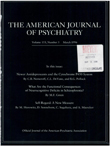Prevalence and incidence of major depression in Alzheimer's disease
Abstract
OBJECTIVE: This study examined the prevalence and incidence of major depressive disorder in Alzheimer's disease. METHOD: The authors retrospectively reviewed two large Alzheimer's disease databases, one at the University of Texas Southwestern Medical Center in Dallas and the other at the Consortium to Establish a Registry for Alzheimer's Disease (CERAD). The Dallas series contained 264 cases of Alzheimer's disease, of which 153 patients were followed up for an average of 3 years from initial evaluation. The CERAD database contained 1,095 cases and excluded patients with histories of depression at initial evaluation; 325 of these patients were followed up for at least 2 years. Alzheimer's disease was diagnosed according to the criteria of the National Institute of Neurological and Communicative Disorders and Stroke and the Alzheimer's Disease and Related Disorders Association; major depression was diagnosed according to the DSM-III-R criteria. Most of the patients in these series were dwelling in the community and had had Alzheimer's disease symptoms for approximately 4 years at the time of evaluation. RESULTS: In the Dallas series there was a 1.5% prevalence and a 0% incidence of major depression. In the CERAD series there was a 1.3% 2-year incidence of major depression. CONCLUSIONS: The low prevalence and incidence of DSM-III-R major depression in these patients suggest that for the period of time the patients were followed up, Alzheimer's disease did not predispose to major depression. However, major depression may herald the subsequent onset of dementia. Depression in dementia should perhaps be diagnosed by different criteria.
Access content
To read the fulltext, please use one of the options below to sign in or purchase access.- Personal login
- Institutional Login
- Sign in via OpenAthens
- Register for access
-
Please login/register if you wish to pair your device and check access availability.
Not a subscriber?
PsychiatryOnline subscription options offer access to the DSM-5 library, books, journals, CME, and patient resources. This all-in-one virtual library provides psychiatrists and mental health professionals with key resources for diagnosis, treatment, research, and professional development.
Need more help? PsychiatryOnline Customer Service may be reached by emailing [email protected] or by calling 800-368-5777 (in the U.S.) or 703-907-7322 (outside the U.S.).



